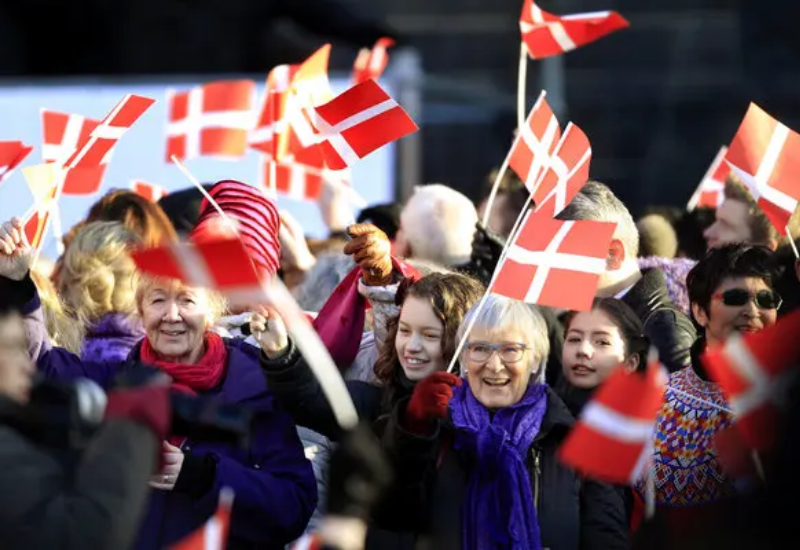Apart from basic greetings like saying hello, knowing how to say thank you is a very fundamental aspect of spoken language. Generally, saying thank you is a universal way of extending our appreciation and gratitude towards someone. In today’s blog, we’ll take a journey to Denmark and learn how to express and say thank you in Danish language.
What You Need To Know About Danish Language

Danish is the national language of the Danes, who are the native citizens of Denmark. It’s a North Germanic language with over 6 million native speakers, who mostly reside in Denmark. The Kingdom of Denmark is located in the south of the Scandinavian region of Europe. The Faroe Islands and Greenland are also included in the parts of this country, operating as autonomous territories. Due to this, Faroese, German and Greenlandic languages are some of the minor languages spoken by the Danes in their motherland.
As Danish is a Nordic language, it is largely mutually intelligible (in terms of vocabulary and pronunciation) with Norwegian and Swedish. For your information, Danish uses the Dano-Norwegian alphabet which is based on the Latin alphabet, with a total of 27 characters.
How To Say Thank You In Danish
1) Tak – Thank You/Thanks
This is the most basic, general way of saying thank you in Denmark. It’s universally used by the native Danes in every context – formal, informal, or semi-formal. Despite the formality or the circumstances, it’s the main vocabulary in conveying thank you to other people. Having that said, feel free to smile and say tak to anyone (regardless of age), anytime and anywhere!
2) Mange tak – Thanks A lot
When you speak Danish, you may want to amplify your gratitude towards a person. In this case, you could include the quantifier mange, which literally means ‘many’ or ‘a lot’ when translated. Rather than just say tak, you can say thanks a lot to someone by uttering mange tak!
3) Tusind tak – Thank You Very Much
Another alternative to say thanks a lot (like mange tak) is by articulating tusind tak. The meaning of tusind is thousand and it’s a form of quantifier as well. This phrase is different for you to say thank you very much or thanks a lot in Danish.
4) Mange tusind tak – Thank You Very Much
If you really want to emphasize your deep gratitude and appreciation in the thank you phrase, you can combine the two quantifiers mange and tusind! The words, when combined together with thank you, will form a similar meaning as the phrases before, which is thank you very much or many many thanks (if directly translated).
5) Mange tusind gange tak – Thank You A Thousand Times
Wanting to state thank you so much to a person in a formal situation? Well, there’s a formal way to do it. You could say mange tusind gange tak instead. This specific phrase literally means “many thousand times thanks”. The word gange means times, which acts as a multiplier to enhance your appreciation.
6) En million gange tak – A Million Times Thank You
If you’re traveling to Denmark, try listening to how the native speakers speak and see if you heard anyone uses this phrase. Sometimes, a local would think a thousand times aren’t enough, so he uses the seven digits instead! Yup, you guessed it right – en million translates to a million. It’s an extended way of saying thank you so much.
7) Selv tak – You’re Welcome/Thanks, You Too
Selv tak technically means you’re welcome, but in the Danish culture, it means more than that. This phrase is also used when people want to thank someone back. but I like that it makes it so you’re thinking the other person back. See what I mean – even if their friends are thanking them, the Danes can’t help themselves and must say thank you, too!
8) Det er meget venligt af dig – That’s Very Kind Of You
If you want to find another way of expressing thanks, this is the expression you need. You can respond to a person’s kind act by saying det er mege venlight af dig!
9) Tak for dine venlige ord – Thanks For Your Kind Words
Yup, this one is related to the previous expression. Whenever anyone compliments you or utter words that please your heart and ears, you can value and cherish his words by acknowledging them and say thanks for your kind words!
10) Tak fordi I kom i dag – Thank You For Coming Today
Your friends showed up when you invite them over? You can thank them as they have spent their free time with you by saying thank you for coming today. Of course, sometimes it’s already adequate if you say tak fordi i kom, which translates to thank you for coming. This particular Danish expression can be said the moment your friends are in front of your doorstep or the moment they are about to leave. So, as a host, feel free to say it whenever you want.
11) Tak for invitationen – Thanks For The Invite
In the preceding example, you’re told that you can use that expression to thank your guests. Well, this time, you’re the one invited. So, before parting ways and addressing your goodbye, you can appreciate the host’s invitation by thanking them.
12) Tak for i dag/i aften – Thank You For Today/Tonight
Similar to previous expressions, this one too, is also quite typical. Rather than being said by either the host or the guest, this one suits both. So, no matter what character you play that day, be it the one inviting or the one being invited, feel free to express this phrase to your company, so they’d know the time spent is being appreciated and cherished.
13) Tak for mad – Thank You For The Meal
This expression, unlike the earlier ones, is used exclusively for food. If you’re served with great food and you had a lovely night, you can thank the cook or host by uttering tak for mad. By doing so, they’ll know you had a great time (and a happy tummy!)
14) Tak, fordi du tilbringer tid sammen med os – Thank You For Spending Time With Us
Identical to the expressions before, this expression is an alternative if you want to thank those who have chosen to spend their time with you.
15) Tak i lige måde – Likewise/Same To You
This Danish phrase figuratively means thanks in equal manner, which stands for likewise or same to you in English. You can use it to return a compliment or any kind of words given to you. This kind of gesture doesn’t only portray your polite manner, it also signifies that you’re good-natured and friendly.
16) Tak skal du have – Thanks A Lot
To be polite in a formal setting, you can address your appreciation by uttering tak skal du have, which is thanks a lot.
17) Takker – Thanks (Casual)
Another phrase you’ll hear a lot in the motherland of the Danes is takker, which spells out as thanks. It’s the casual way of conveying your appreciation and gratitude. This word comes from the phrase jeg takker dig; I thank you.
18) Tak for sidst – Thank You (For The Last Time I Saw You)
For a start, this expression is quite unique and interesting. It’s the phrase you use to convey your appreciation and gratitude for people you hung out with before. This expression is a polite way of showing how much you appreciate their presence and company last time. It’s a great expression as it helps to foster a stronger friendship.
19) Ellers tak – Thanks, But No Thanks
This is the exact equivalent of the English “thanks, but no thanks”. Feel free to use it whenever you need to.
20) Tak for din overvejelse – Thank You For Your Consideration
This bit has a rather formal tone to it. Even in its English translation, you would already know that people use this in the professional industry, especially when it comes to seeking jobs, submitting proposals, and pitching.
21) Tak for gaven – Thank You For The Gift
Do you love getting surprises and receiving gifts? Well, be sure to appreciate the ones who give them to you by uttering tak for gaven!
Other Important Phrases In Danish
Let’s see and learn other common Danish phrases beginners as you must know. If you’ve already skimmed through, you’ll notice how the words resemble similar features with each equivalent English word. Yup, you’re not wrong about that. Both Danish and English originated from the same root, the Germanic language family. So, it’s rationally sensible to see resemblances and similarities here and there. Now, let’s take a look at some important Danish phrases we should know.
| DANISH | ENGLISH |
| Hej | Hello |
| God morgen | Good morning |
| Godnat | Good night |
| Farvel | Goodbye |
| Hvordan har du det? | How are you? |
| Ja | Yes |
| Nej | No |
| Undskyld | I’m sorry |
| Jeg forstår ikke | I don’t understand |
| Taler du engelsk? | Do you speak English? |
Learn Danish Language Today

So, I hope you learned a thing or two from today’s blog. The key takeaway is that learning a new language is always a fun thing to do. Try learning this particular Nordic language. You can never go wrong with the Danish language. Just so you know, Danish is one of the easiest North Germanic languages to learn. Learn Danish through Ling App – it teaches you basically everything you need to know – alphabets, basic phrases and expressions, greetings, pronouns, grammar, pronunciation and so much more! If you use Ling App consistently, you’ll soon be surprised to see how much progress you have made.















3 Responses
Working with a Danish client for the first time and this is the most helpful article I have come across. Thank you, Sarah. Salam to you and your family.
ak skal du have
Is it true that in Dutch if you thank your host for dinner it is too formal and it doesn’t show interest in becoming friends . I read this ” in Netherlands where there’s gratitude there’s no room for friendship ” I would like to know more about it